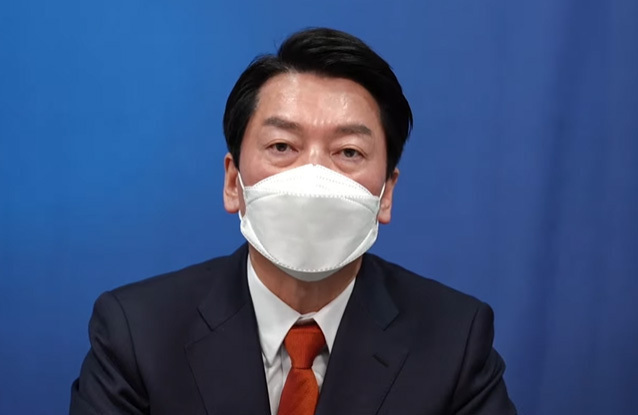 |
Presidential candidate Ahn Cheol-soo of the minor opposition People’s Party suggests a campaign merger with the main opposition People Power Party’s rival Yoon Suk-yeol, in a livestream announcement on his YouTube channel on Sunday. (Yonhap) |
진행자: 조혜림, Paul Kerry
1. Ahn suggests unifying candidacy, ‘public primary’
기사 요약: 대선 국면에서 야권 단일화 요구한 안철수 국민의당 대선후보.
[1] Presidential candidate Ahn Cheol-soo of the People’s Party on Sunday suggested unifying candidacies with the main opposition party’s Yoon Suk-yeol, and letting the public decide which of them will run.
*candidacy: 입후보, 출마
*run: 경쟁하다, 참여하다, 뛰다
[2] Ahn explained that, even if an opposition party candidate wins in the presidential election, consensus from the public is crucial as over half of the 300 seats in the National Assembly are occupied by lawmakers of the ruling Democratic Party of Korea.
*consensus: 의견 일치, 합의
*crucial: 중대한, 결정적인
*lawmaker: 입법자
#legislator, politician, representative
[3] On Ahn’s proposal, the main opposition People Power Party stuck to their previous suggestion that its flagbearer Yoon and Ahn would privately discuss the campaign merger to come to an agreement on the ultimate candidate.
*stick to: 방침을 고수하다, 굳게 지키다
*flagbearer: 기수
*merger: 합병
*ultimate: 궁극적인, 최후의
기사 원문: http://www.koreaherald.com/view.php?ud=20220213000177
2. What the Korean dictionary says about society
Revisions and new word additions reflect gender neutrality, yet leave out migrants and sexual minorities
기사요약: 국립국어원의 표준대국어사전 전면 개편, 양성 평등 표현은 개선됐지만 사회적 약자나 소수 시민에 대한 인식 부족에 대한 지적.
[1] Korean men who grew up in the 1980s or 90s would likely remember the first time they were taken to the barber shop, a transformative moment of entering the realm of men instead of tagging along with their mothers to join other women at the hair salon.
Hair salons are for women, and barber shops are for men. This was the mainstream view back then. But these places are no longer defined as such, and changing definitions in the Korean language reflect changes in society.
*transformative: 변화의, 전환의
*realm: 영역, 범위
*tag along: 따라가다
[2] According to the NIKL, when a certain word is widely used by the public and has a specific definition, it goes through a committee review and is added as a new word upon approval. Public opinion and recommendations by the Human Rights Commission of Korea also factor in the reviews.
*review: 검토, 비평
[3] Rep. Oh Young-hun of the ruling Democratic Party of Korea said that the NIKL’s official language is devoid of words related to social minorities or marginalized groups.
As of January 2021, there is no word in the official dictionary that refers to immigrant workers, or “i-ju-no-dong-ja” in Korean, despite its frequent use in popular discourse and government documents. The same goes for transgender or queer, although homosexuality (dong-seong-ae) and bisexuality (yang-seong-ae) are registered.
*devoid of: ~이 없는, 결여되다
기사 원문: http://www.koreaherald.com/view.php?ud=20220210000393
[코리아헤럴드 팟캐스트 구독]
아이튠즈(아이폰): https://itunes.apple.com/kr/podcast/koliaheleoldeu-paskaeseuteu/id686406253?mt=2
네이버 오디오 클립(아이폰, 안드로이드 겸용): https://audioclip.naver.com/channels/5404
팟빵 (안드로이드): http://www.podbbang.com/ch/6638







